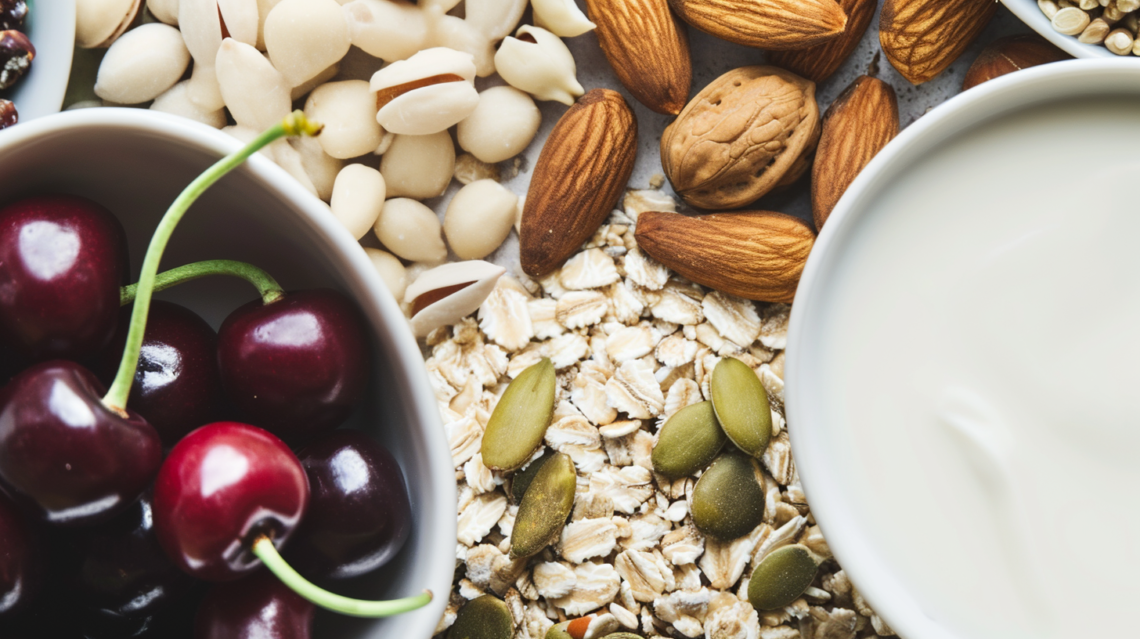
Eating Your Way to a Better Sleep
In the fast-paced rhythm of modern life, achieving a good night’s sleep can often feel like a distant dream. Amidst this backdrop, the role of diet in influencing sleep patterns has garnered significant attention. Keep reading to learn more about the intricate relationship between what we eat and how we sleep, exploring various foods that can act as natural sleep aids.
The Science of Sleep and Nutrition
The interplay between nutrition and sleep is a complex, bidirectional relationship. Nutrients can influence neurotransmitters and hormones that regulate sleep, such as melatonin and serotonin. Conversely, sleep quality can affect dietary choices, often leading to increased cravings for high-calorie, low-nutrient foods. Understanding this relationship is crucial in identifying foods that can facilitate better sleep.
Foods That Enhance Sleep Quality
- Fatty Fish: Salmon, trout, and mackerel are rich in omega-3 fatty acids and vitamin D. These nutrients have been linked to the production of serotonin, a precursor to melatonin, the hormone that governs our sleep-wake cycles. A study published in the ‘Journal of Clinical Sleep Medicine’ found that higher fatty fish intake improved sleep quality.
- Nuts and Seeds: Almonds, walnuts, flaxseeds, and pumpkin seeds are not just nutrient powerhouses but also contain melatonin and magnesium. Magnesium, in particular, has been observed to improve sleep quality, especially in individuals with insomnia, as per research in the ‘Journal of Research in Medical Sciences’.
- Dairy Products: The age-old advice of drinking a warm glass of milk before bed has scientific backing. Dairy products like milk, yogurt, and cheese are rich in calcium, which helps the brain use tryptophan to produce melatonin. Additionally, dairy contains its own source of melatonin, potentially enhancing its sleep-inducing effects.
- Cherries: Particularly tart cherries or tart cherry juice can be a natural source of melatonin. Studies, including those published in the ‘European Journal of Nutrition’, have shown that tart cherry juice can improve sleep duration and quality.
- Complex Carbohydrates: Whole grains like oats, barley, and brown rice have a low glycemic index and can help in releasing insulin, which in turn facilitates the uptake of tryptophan into the brain. Tryptophan is then used in the synthesis of serotonin, a precursor to melatonin.
- Herbal Teas: Certain herbal teas such as chamomile, lavender, and lemon balm are known for their natural sedative properties. Chamomile, for instance, contains an antioxidant called apigenin, which may help to initiate sleep.
- Leafy Greens: Vegetables like kale, spinach, and mustard greens are rich in calcium, magnesium, and potassium. These minerals play a role in sleep regulation by supporting neurotransmitter and muscle relaxation functions.
- Kiwi: This fruit is rich in antioxidants, serotonin, and folate, all of which may have beneficial effects on sleep patterns. A study in the ‘Asia Pacific Journal of Clinical Nutrition’ found that eating kiwis before bed resulted in better sleep quality and duration.
- Poultry and Eggs: These protein-rich foods are good sources of tryptophan. The body uses tryptophan to produce serotonin, which is then converted into melatonin.
- Legumes: Beans, lentils, and chickpeas are rich in B vitamins, especially vitamin B6, which is necessary for the production of melatonin.
By integrating a variety of these sleep-enhancing foods into our daily diets, we may improve not just the quantity but also the quality of our sleep. As always, individual dietary needs and restrictions should be considered, and consulting a healthcare provider for personalized advice is recommended. Embracing a diet rich in sleep-promoting foods can be a natural and effective way to improve our overall health and wellbeing, ultimately leading to better sleep and a more vibrant life.

